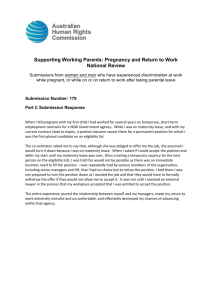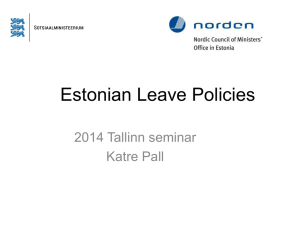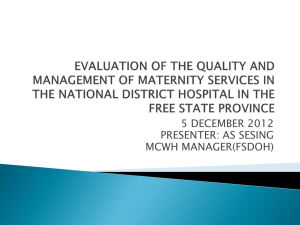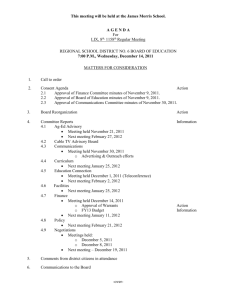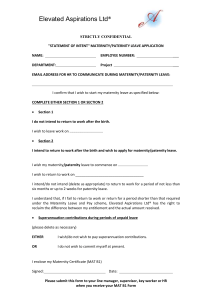Work–life balance Best Practice What is work–life balance?
advertisement
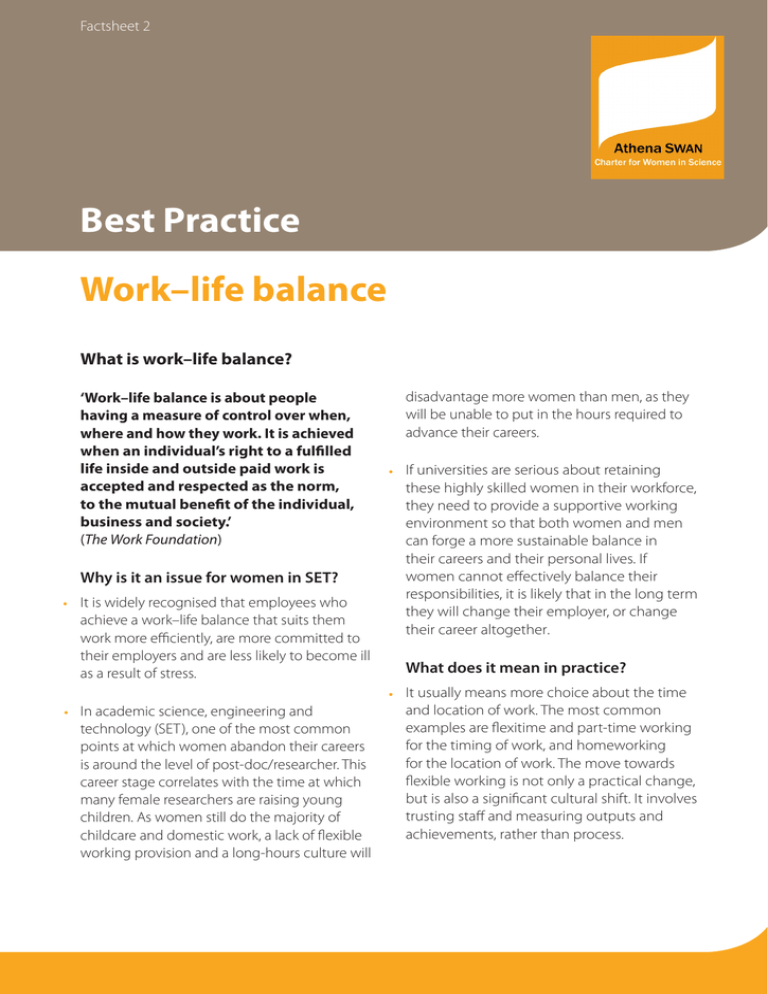
Factsheet 2 Best Practice Work–life balance What is work–life balance? ‘Work–life balance is about people having a measure of control over when, where and how they work. It is achieved when an individual’s right to a fulfilled life inside and outside paid work is accepted and respected as the norm, to the mutual benefit of the individual, business and society.’ (The Work Foundation) Why is it an issue for women in SET? • It is widely recognised that employees who achieve a work–life balance that suits them work more efficiently, are more committed to their employers and are less likely to become ill as a result of stress. • In academic science, engineering and technology (SET), one of the most common points at which women abandon their careers is around the level of post-doc/researcher. This career stage correlates with the time at which many female researchers are raising young children. As women still do the majority of childcare and domestic work, a lack of flexible working provision and a long-hours culture will disadvantage more women than men, as they will be unable to put in the hours required to advance their careers. • If universities are serious about retaining these highly skilled women in their workforce, they need to provide a supportive working environment so that both women and men can forge a more sustainable balance in their careers and their personal lives. If women cannot effectively balance their responsibilities, it is likely that in the long term they will change their employer, or change their career altogether. What does it mean in practice? • It usually means more choice about the time and location of work. The most common examples are flexitime and part-time working for the timing of work, and homeworking for the location of work. The move towards flexible working is not only a practical change, but is also a significant cultural shift. It involves trusting staff and measuring outputs and achievements, rather than process. ki fulfilled life inside a ple having a measure of co al, busi ht to a nd o ntro ut peo vidu l’s rig s abo l i uts a o e u c indi ver dlife ins i ing a measure of i measure oeoplebhaalavn d e e l l v i d f l d e l l i l i i u f f e l f u h i f n a i de an d ep sidegaht to wh cont ft t to a ut p f cofe i nd o an in d ou aid r en ual’s righ fit o s abo ork–li ntrol o al’s r fulfilled life inside ploel hovaeving a measure of co ,vwid W wo l bene heuntsid ver ht totsaide an d vidu ut peo i i g i o n r w r d d b h t l be s a w ’ r n l ep ol no in out i ere wnhce is pa he tuar tua ved an idua a ve s a u u a v i e e l i n i d n n i a d i a d n m m e rw din ,w nd wo he ,w ife b ach he e pa he wh he he an wo heod w he rk–l r id ccep st to t to t n, t is re ieved hen re ‘Wo m, whhiev w they work. I wo tedorm, ted a w r a h o an n d c d c er n and respec n e a a e e v dh a c ho th thc ea cc ie I t is I t is ow w th ept d as a d as epte nd a ch they work. ey work. d and respecte ed and respecte cc how I t is . ept d k r they wo ed and respecte sa ki rk rk sa is is • In reality, many academics have long had Maternity and childcare freedom about the location and timing of their • Recruit a dedicated childcare and work–life work. However, in SET disciplines, particularly balance adviser to provide specialist guidance at the early career stages, this is not always to staff and students, to help them find possible as much of the work can be lab-based, appropriate childcare solutions or working site-based or field-based and therefore does practices to suit their individual family not offer much location flexibility. circumstances. (King’s College London) • Athena SWAN award-winners have introduced some creative solutions to address the particular challenges in SET so that working practices can be made more inclusive, to the benefit of both men and women. Some of these are outlined below. • To find out more about these initiatives and other SWAN-related work, contact the respective universities directly. Contact details for all SWAN members can be found on the membership section of the SWAN website: www.athenaswan.org.uk/html/athena-swan/ membership. Flexible working • Offer a range of flexible working and parttime working arrangements such as extended lunch breaks to enable care of elderly relatives, variable hours to enable staff to complete school pick-up, and a gradual change in hours to facilitate the return to full-time working for parents of young children. (Department of Mechanical, Materials and Manufacturing Engineering, University of Nottingham) www.athenaswan.org.uk • Create a support group to link women planning maternity leave with those who have recently returned from maternity. (University of Reading) • Allow maternity leavers with research grants to place them in abeyance while the school employs contract research staff (CRS) from the grant as temporary teaching fellows. Reemploy the CRS once the grant is resumed on the staff member’s return. (University of Nottingham, School of Psychology) • Extend contracts for fixed-term research staff to cover maternity leave and enable the individual to return and complete the outstanding months on the original contract. (University of Reading) • Ensure lighter teaching and administrative loads for women returning from maternity leave to enable them to achieve a work–life balance and re-establish their research base. (University of Nottingham and University of Bristol) iet , business and idual so ndiv i c e in es s a n , businesosf athnd d s dividual t i so f e n i s e o n u s b s n i c , an d e e idual f th al b so ndiv fit o utu he i t m f ene e o h t t i f to ne m, l be nor tua u the m he to t m, r o n the d as y.’ iet cie ty.’ y.’ cie ty.’ • Provide for one term of sabbatical leave without teaching commitments for researchactive academics returning from maternity, adoption, extended carer’s or long-term sickness leave. This leave will enable staff to re-establish their research activity more quickly. (University College London) • Develop a childcare package that includes after-school and summer holiday provision, a voucher scheme and a salary sacrifice scheme, and a register of childminders. Implement a maternity leave cover scheme giving schools funding to find replacement cover. (Queen’s University Belfast) • Give all staff with caring responsibilities the opportunity to apply for up to two years’ unpaid leave under a career break policy, in addition to maternity and paternity leave entitlements. (University of Manchester) Promotion and progression • Allow part-time academics to supervise PhD students, in order to strengthen their CV. (University of Manchester) • When vacancies occur for lectureships, encourage appropriate internal candidates to apply, through mentoring. Extend this encouragement to those working flexibly, part-time or currently on a career break. (University of Leicester) Raising awareness • Conduct a web-based survey of academic line managers and academic and research staff with caring responsibilities in the university’s SET faculties in order to discover how widely the university’s flexible working policy is known. (University of Manchester) • Design a programme of training for managers, including principal investigators, about the need to concentrate on outputs rather than inputs. Carry out a communications campaign with staff and managers, followed by an evaluation of the success, or otherwise, of their work–life balance initiatives. (University of Leicester) • Create a dedicated section of the university website on the benefits of a positive working environment for staff and managers. (University of Bristol) • Review the promotion systems to prevent any discriminatory barriers to progression. Invite candidates to declare any significant periods of Recruitment ‘time out’ that may be relevant to their career history, for example, caring for children or other • Include details of family-friendly policies in the information sent out to potential job relatives, maternity leave or long-term sickness. applicants. Advertise on the university website (Lancaster University) the availability of flexible working schemes that can be tailored to the needs of individuals. (Lancaster University and University of Bristol) www.athenaswan.org.uk ki e having a measure of co to a fulfilled life inside and t peopl al, business and ntro right abou out vidu s l ov i so e ueal’s cg a measure indi s d i n n i i v e d e e l a i a l f l v i d f h l l d e i l l i l i n i u f f e e l f l s r u he h inside ht to a ind ide an of co af ep ocp ba wh ntro of t of t gand ght to i d i n r r t t a –loifnetrol e i i a s o s ’ ’ a m g f f n l i e l v i a a d oeun sure of u fulfille life inside n, idua dw ua ne ne ove peoplel hover cont w ht totsaide an d ivid wh tside l be o l be r w e is about wh rol n indiv her l’s rig out ind pa to pa tuar tua ved en an idua a ove ea nhcen s u u a v i e l i i m, d n n i a d i d m m e rw e d ,w nd wo ,w nor life b n inwo ach he e pa he wh wh e he h – t t a c h k s h h d d t r i e n o o r id cep t eo n, t ere e re ieve as ,t Wo whhiev w they work. I wo tedorm, wh a ected orm an ach nd h ac ere e n and resp ved dh ac chce n h s s e i t i t i o s s t t c h I I ep ow a or w th an ept da ac ted an respected they work. en ey work. dh ac ed and respecte d s th t is c I ow a . e d k pted they wor te and respec sa ki rk rk sa is is Scheduling meetings and timetabling • Hold all key meetings in family-friendly core hours. (University of Nottingham) • Undertake timetabling centrally, with a requirement that the head of school signs off periods of unavailability for teaching by individual academics, to make timetabling fairer. (University of Reading) Sources of further information and guidance • The Athena SWAN Charter is a scheme to recognise and share good practice on gender equality in SET in higher education employment. www.athenaswan.org.uk • The Flexible Employment Options project, funded by the Higher Education Funding Council for England, has produced research and guidance on the practicalities of flexible working in the higher education sector. www.staffs.ac.uk/feo • The Joint Negotiating Committee for Higher Education Staff has published Work–Life Balance Guidance for Higher Education Institutions. www.ucea.ac.uk/objects_store/JNCHES_ Work-Life_Balance_Guidance.pdf • The final report of the former Equal Opportunities Commission’s investigation into the transformation of work is entitled Enter the Timelords: Transforming Work to Meet the Future. www.equalityhumanrights.com/en/projects/ workingbetter/transformingwork/Pages/ default.aspx • The Chartered Institute of Personnel and Development has produced a factsheet and other guidance on the health aspects of work– life balance. www.cipd.co.uk/subjects/health/ worklifebalance • The University of Bristol’s ‘Positive Working Environment’ web pages provide a range of advice and information on the benefits of a work–life balance. www.bris.ac.uk/pwe/work_life_balance.html The SWAN Charter is funded by Equality Challenge Unit and the UK Resource Centre for Women in Science, Engineering and Technology
